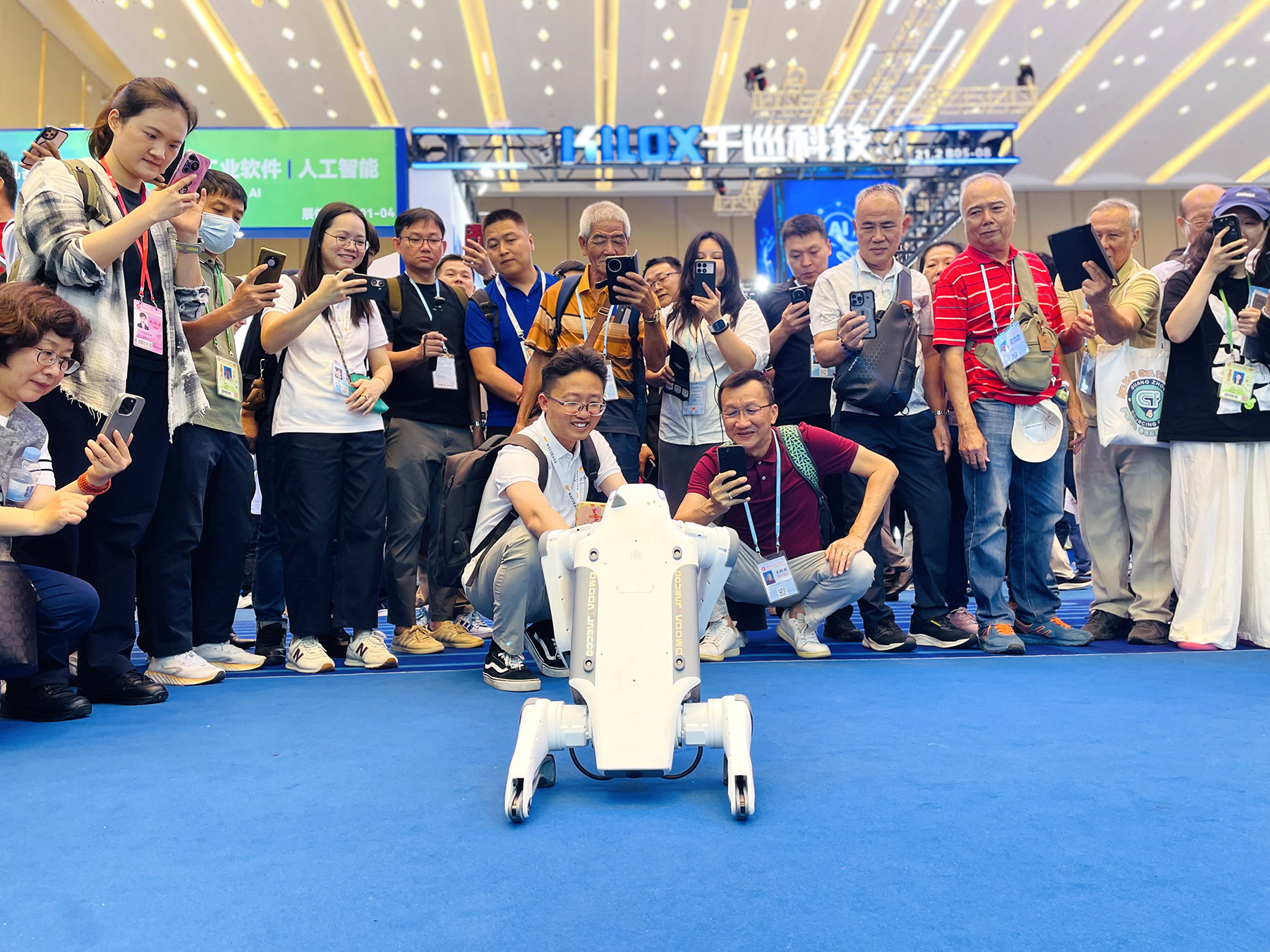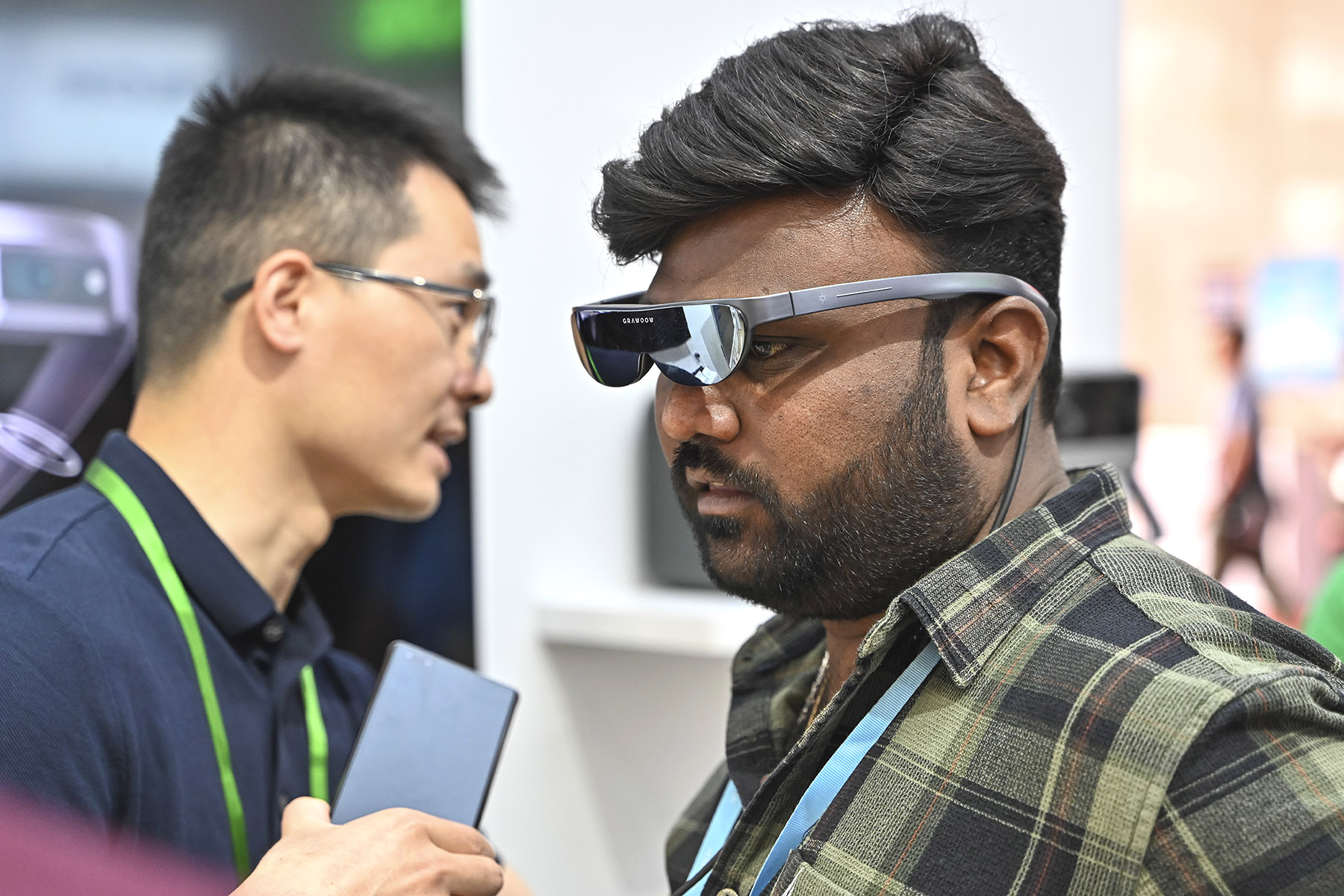Biannual event helps businesses stay competitive despite US tariff war

John Leal, founder and CEO of ODM Pacific Ltd, was looking for industrial machines during the 137th China Import and Export Fair that can improve production efficiency for factories in Brazil.
Leal is a regular visitor to the global trade event, popularly known as the Canton Fair. He sees the biannual event, which showcases virtually the entirety of industrial and consumer good categories, as one of the best platforms for global trading.
"I have been visiting more than 10 sessions of the fair — so I have seen a lot of buyers coming here to get new ideas to start new businesses," said Leal, with several badges of the fair hanging around his neck.
READ MORE: Resilience of export firms bearing fruit
"I get one badge coming here each session. I collect them with pride because my life is built around the foreign trade business with Chinese suppliers," he said. The Brazilian businessman also looked for innovative home and furniture products during the fair that are expected to be hot items sold to the overseas market.
"As people's houses are getting more and more expensive worldwide, we are looking for innovative products like home appliances and furniture that can help save space," he said.
Leal meets with his Chinese suppliers every six months. He said the fair allows him to stay connected with his suppliers, adding "it's a great place to continue my business".
Additionally, Leal supported other overseas buyers in selecting products during the fair — not only checking the credibility of suppliers, but also evaluating technical details of the products.
"Because very often the buyers are not in engineering, they don't know how to assess the quality of those products — so I try to help them select the best Chinese suppliers and do some modifications to make their products more suitable for markets overseas," he said.
Leal's company expects to bring innovative products selected during the fair to Brazilian and worldwide customers.
"Actually the current trade war is also a great opportunity for many buyers worldwide. If people can adapt and find a new market, it can be good for both sides like buyers from Brazil and Chinese exporters," he said.

The current turbulence in global trade means that there will be more products available and more latitude to negotiate with Chinese supplier prices, according to Leal.
Chinese factories are less busy with orders, so buyers from new markets have room to negotiate better prices, and the factories have the opportunity to expand their products to new markets such as South America, he said.
"We need to act fast and take advantage of the current uncertain global trade situation," Leal said. "We have noticed a big increase in demand of industrial machines in Brazil, from last year to this year, because local businesses have been trying to find alternatives to increase margins."
The fair's spring session proved more popular, and emerging markets remained the largest source of overseas buyers for the showpiece, which concluded in early May in Guangzhou, capital of Guangdong province. The fair, commonly seen as a barometer of China's foreign trade, is held twice a year in spring and in autumn in Guangzhou.
As of May 4, a total of 288,938 overseas buyers from 219 countries and regions were recorded as having attended the global trade event, representing a 17.3 percent increase from the 135th session of the fair, also held in spring last year, according to the organizers.
Of those that attended, a total of 187,450 buyers were from countries participating in the Belt and Road Initiative, marking a 17.4 percent increase compared to the fair's 135th session and accounting for 64.9 percent of the total.
Buyers from BRICS countries and members of the Regional Comprehensive Economic Partnership also increased significantly, showing a growth of 24.1 percent and 6.9 percent, respectively, according to the fair's organizers.
"Brazilian companies all dream about one day importing from China," said Leal, adding nowadays around 30,000 companies in Brazil currently import from China, but stressed the importance of understanding your market and your product.
"It's always important to know where you are going to sell products. If you don't know the market, you don't know the product, then no matter how good the product is, you cannot make a successful business," said Leal. He said interest from Brazil was not only confined to industrial machines, but also evident in consumer and retail oriented businesses like jewelry, clothing or electronics.
"Overseas buyers showed active interest in placing orders, further boosting companies' confidence in expanding into diversified markets," said Zhou Shanqing, deputy director of the China Foreign Trade Center and head of the fair's media center.
The on-site intention turnover during the fair amounted to $25.44 billion, marking a 3 percent increase compared with the fair's 135th session.
Transactions with countries participating in the BRI accounted for over 60 percent of total turnover, playing an important role in driving transaction growth, while transactions with traditional markets remained stable, according to Zhou.
"Exhibiting companies commonly reported that products with good quality, strong innovation features and high brand recognition were more favored by overseas buyers," said Zhou.

Deng Guobiao, founder and CEO of cross-border trade payment platform XTransfer, said that trading funds from emerging markets — including the Middle East, Africa and South America — had increased significantly since early this year.
"We will introduce more preferential cross-border payment policies to support Chinese companies to expand their business in emerging markets," said Deng.
Suofeiya Home Collection, which builds custom cabinetries with matching accessories, plans to expand its business in emerging markets, supported by its domestic intelligent manufacturing.
"The strength in intelligent manufacturing, along with strong supply chains, will greatly enable us to deliver products and services more efficiently in overseas markets," said Jiang Hao, general manager of Suofeiya's manufacturing center.
Suofeiya established a fully intelligent manufacturing factory for custom furniture in 2018, achieving full-process informatization, digitization and intelligence from design to production and installation services.
"This breakthrough addresses common challenges in the custom home industry, such as high labor costs, low production efficiency, long supply cycles and unstable product quality," Jiang said.
The company, based in Guangzhou, has so far established five major intelligent factories nationwide, realizing the large-scale production of all categories of custom clothing, wardrobes, doors and wall cabinets in a one-stop customization process.
"The intelligent workshop has helped lead the industry's transformation from traditional manufacturing to high-tech service-oriented manufacturing," said Jiang.
The company has always been looking for overseas business partners, particularly from emerging markets, to develop its engineering operations and expand its retail channels, according to Jiang.
The company has developed 31 international distributors covering the US, Canada, Australia, Singapore, Vietnam, Thailand and the Middle East, providing a one-stop soup to nuts customized solution.
In addition to looking for opportunities in emerging markets, Chinese companies also expect to expand their businesses in the domestic market, by leveraging the robust development of e-commerce.
Guangdong Linkfair Household Co, a joint-stock company established in 2014 in the stainless steel kitchenware and tableware industry, brought livestreaming into the fair's Pazhou Complex, with a bustling crowd of visitors at its booth and enthusiastic discussions with foreign buyers.
ALSO READ: 137th Canton Fair showcases China's latest AI development
"We wanted to make domestic consumers intuitively feel that our products are selling hot globally," said Liang Jianxiu, general manager of the company's domestic marketing department.
In 2025, the company aims to achieve domestic market sales revenue of 400 million yuan ($55.3 million), more than double the previous year, according to Liang.
Chinese e-commerce platforms like JD and Meituan have also actively strengthened their cooperation with export-oriented enterprises to expand sales in the domestic market.
JD announced a 200 billion yuan "export-to-domestic sales policy "support plan during the fair, establishing a special project team for sales in the domestic market and providing end-to-end support for export-oriented companies.
Meituan, another leading e-commerce platform, held a special matching meeting during the fair, collaborating with over 100 foreign trade enterprises from industries such as seafood, vegetables, fruits, seasonings, snacks and beverages to expand their sales in the domestic market.
qiuquanlin@chinadaily.com.cn


